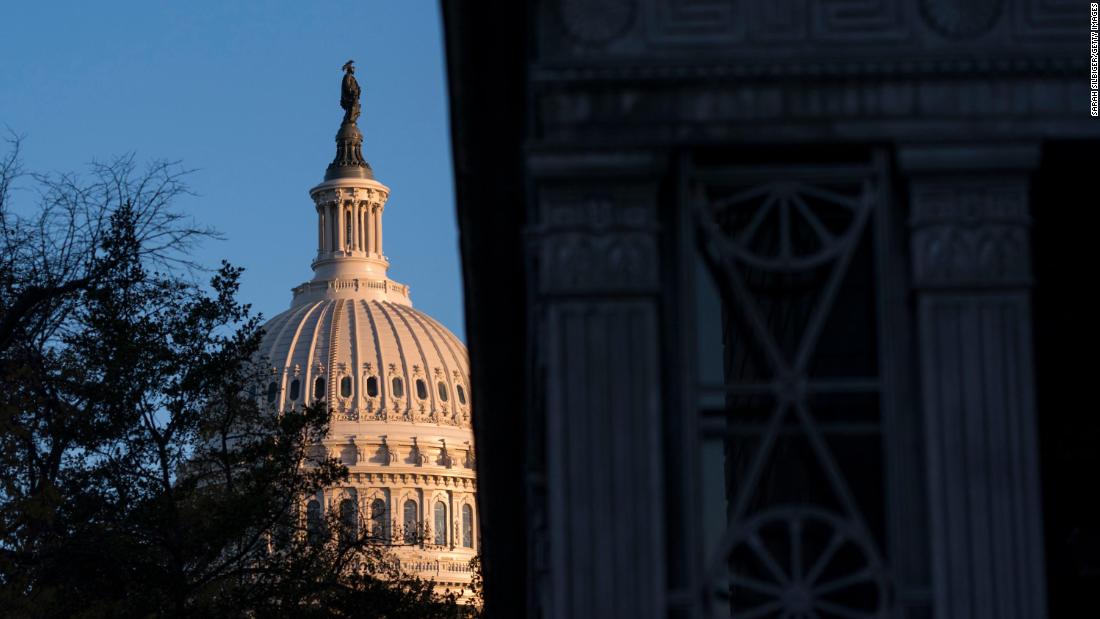Retired Army Lt. Gen. Russel Honoré and other former military leaders faced pointed questions from House members about the security review conducted after the January 6 riot, with Republicans complaining that the review excluded their input and Democrats pressing to ensure the protocols in place are effectively keeping them safe.
The task force established to review security at the US Capitol released its final report Monday, which calls for sweeping changes to improve US Capitol Police’s emergency response and multiple security enhancements around the Capitol complex.
The report includes recommendations for increasing Capitol Police’s intelligence gathering capabilities, a permanent quick reaction force, mobile fencing that can replace the current temporary security structure and an overhaul of how members are protected in their home districts.
In a closed-door briefing Monday afternoon, Republicans contended that the review should have been more bipartisan, a concern sources at the briefing said was raised by Republicans in the room and later echoed by Rep. Darrell Issa.
“This was not a bipartisan investigation, this was Nancy Pelosi’s investigation,” Issa, a California Republican, told CNN. Issa said the Honoré task force is calling for “a lot of requests for money, not a really comprehensive plan at all,” questioning the report’s call for an additional 900 US Capitol Police officers and members of USCP’s force, when he said there were only 232 vacancies on January 6.
A Republican at the briefing asked the task force members if any evidence ever materialized showing a GOP member was involved in planning the attack. The answer was no, according to a source who was in the room.
Honoré was tasked by House Speaker Nancy Pelosi in January to lead a review of Capitol security, following the deadly riot.
The report is the first detailed assessment addressing how to fix what went wrong at the Capitol when insurrectionists breached the Capitol walls and overran Capitol police who were badly outnumbered. The report touches on everything from the intelligence and emergency response failures to the staffing levels of the US Capitol Police.
“The USCP were understaffed, insufficiently equipped, and inadequately trained to secure the Capitol and Members when violently attacked by a large mob,” the report concludes.
House Appropriations Chairwoman Rosa DeLauro told reporters after leaving the Monday briefing that “there’s probably a substantial investment” Congress will have to make in security in light of Honoré’s recommendations.
The Connecticut Democrat did not suggest she feels strongly about the proposal to have retractable fencing, telling reporters, “I want to continue to talk about that.”
CNN first reported last month that that two sources said a draft copy of the review recommended adding more than 1,000 US Capitol Police officers, establishing a dedicated quick reaction force and building an integrated system of walls and fences around the Capitol complex. CNN reported on Thursday that Honoré had briefed senior members of Congress on the review, and Rep. Tim Ryan, an Ohio Democrat, said that he believes Honoré is “hitting the nail on the head” with his recommendations.
But Democrats, too, questioned Honoré, with some leaving with more questions than answers.
Democratic Rep. Pramila Jayapal of Washington told CNN that she asked Honoré to explain who made the calls about which security protocols would be put in place at the Capitol leading up to January 6, but Honoré said it was outside the scope of his investigation.
“I wanted to know for January 6, who made those calls? … Was it the White House, was it our leadership, was it the Capitol Police board? Who was it?” she said. “The general said that that wasn’t part of the scope of the investigation — that there are other committees investigating that.”
The Washington Democrat also asked him to say when the Capitol will be safe again.
“My question is, when will we feel safe and if it’s not going to be for a while, what happens in the interim? What is the timeline,” Jayapal told reporters. “My question really was, how do we know we can come to work, and go home alive? And not have our lives threatened?”
Jayapal said that Honoré told members they can feel safe right now and that there already are measures being put into place to assure everyone’s security at the Capitol. But when pressed by CNN about what kind of timeline Honoré gave about when certain security enhancements, such as the mobile and retractable fencing would be implemented, Jayapal said, “I didn’t get a clear answer to that.”
Acting House Sergeant at Arms Timothy Blodgett sent a letter to all members this morning with a copy of Honoré’s task force findings and recommendations on Capitol Security ahead of the three member briefings Monday.
More officers and mobile fencing
The report recommends Capitol Police increase its staffing by more than 850, including filling more than 200 officer vacancies, adding an additional 350 officers and hiring more than 400 positions to fill gaps, such as intelligence specialists, operational planners and Civil Disturbance Unit personnel.
In addition, Honoré’s report found that security across the House’s 900 district offices was “inconsistent.” The task force recommends funding for every congressional district office to be equipped with proper security systems, along with home security systems for members where warranted.
At the Capitol, the report recommends a mobile fencing option that is “easily erected and deconstructed,” along with a long-term, retractable fencing system for the Capitol and congressional office buildings. The proposal acknowledges the opposition that’s emerged to proposals for making the fencing around the Capitol permanent.
“Such a solution could enable an open campus while giving security forces better options to protect the complex and its Members should a threat develop,” the report says.
Democratic Rep. Raja Krishnamoorthi of Illinois told CNN he was supportive of modifying the fencing around the Capitol, but said it is important to keep the Capitol accessible.
“I think there’s a sense that it’s a little too much of a fortress. And, you know, if we become a fortress and completely inaccessible to the public in some ways I think that the insurrectionists win,” Krishnamoorthi said. “And so we’ve got to out a different formulation at this point.”
The task force also recommends conducting background checks for those who receive identification cards at the Capitol, which includes members and their staffs, which the report says would “decrease insider threat risks and enhance the safety of all Members, staff, and legislative employees.”
That proposal could face resistance from Republicans, who have bristled over security steps Pelosi has taken inside the Capitol to install metal detectors right outside the House chamber.
Jayapal called Honoré’s recommendations “thorough,” and commended the task force for identifying the key areas that Congress needs to invest in, which means that money needs to be approved quickly.
“A lot of it depends on us approving this money quickly,” Jayapal said. “We need to hire these people we need to train them we need to get the technology set up we need to get the retractable fences and if we’re going that direction. Those are things that are going to require Congress to appropriate money.”
Capitol Police said in a statement of the report: “The U.S Capitol Police looks forward to reviewing the detailed recommendations from Lt. General Russel Honoré and his team. We believe enhancements to the Capitol complex’s physical infrastructure are required. We also agree we need to increase our manpower and overall response capabilities.”
‘Too slow and cumbersome’
The task force takes aim at the multiple intelligence and communication failures from January 6. The report concludes Capitol Police was not postured to handle intelligence threats “due to significant capacity shortfalls, inadequate training, immature processes, and an operating culture that is not intelligence-driven.”
The recommendations included an increase of trained intelligence analysts and more integration of intelligence functions into Capitol Police leadership daily operations and planning. “This will require a dramatic, consistent, leader-driven shift in the USCP’s cultural mindset toward threat-based operations and decision-making,” the report says.
The task force concluded that the Capitol Police Board’s “deliberate decision-making process proved too slow and cumbersome” on January 6, recommending changes to how external law enforcement support is requested.
The report recommends a dedicated quick reaction force that could be used not just at the Capitol but across Washington, taking either from existing law enforcement entities or by creating it under the command of the DC National Guard.
The report proposes Capitol Police make several changes to specialized units. It recommends keeping civil defense unit platoons on duty whenever Congress is in session, increasing the size of its explosive detection dog teams and re-establishing a mounted horse unit, which was disbanded in 2005.
“Best used in high pedestrian and dense crowd areas, a well-trained horse and rider can assist in controlling crowds or quelling disturbances with few serious injuries to demonstrators,” the report says.
Leaving Monday’s briefing, Democratic Rep. Steven Horsford of Nevada referred to Honoré’s report as “comprehensive,” laying out “a number of clear recommendations.”
Horsford told reporters that one member in the briefing made the point that resources could differ between every day and special occasions, seeming to push back on the suggestions Honoré and his team are making.
“I think one of the other members was making a point that there’s one set of resources that needs to happen on a special event occasion versus every day, and the ability to be able to mobilize quickly and utilize the resources on a dime when necessary, and be able to take them down when they’re not needed,” he said. “Being able to maintain public access is a cornerstone of our democracy and the people’s house, especially on the House of Representatives side.”
This story has been updated with additional developments Monday.













